|

 Explorers, Scientists &
Inventors
Explorers, Scientists &
Inventors
 Musicians, Painters &
Artists
Musicians, Painters &
Artists
 Poets, Writers &
Philosophers
Poets, Writers &
Philosophers
 Native Americans & The Wild
West
Native Americans & The Wild
West
 First Ladies
First Ladies
 Popes
Popes
 Troublemakers
Troublemakers
 Historians
Historians
 Archaeologists
Archaeologists
 Royal
Families
Royal
Families
Assassinations in History
Who
got slain, almost slain, when, how,
why, and by whom?
 Go to the
Assassination Archive
Go to the
Assassination Archive

Online History Dictionary A - Z



Voyages in History
When did what
vessel arrive with whom onboard and where
did it sink if it didn't?
 Go to the
Passage-Chart
Go to the
Passage-Chart

|
|
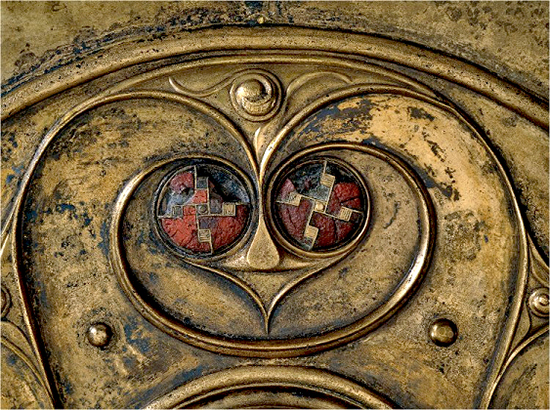
The Celts
The Celts were ancient Europeans who
had their glory days roughly from 700 - 100 BC.
|
|
The term Celt, which you can
also spell Kelt, stems from the Latin word
Celta. One
Celta, two Celtae.
Image Above
Celtic design on the
Battersea Shield.
Length: 77 cm or 30 in. Iron Age, 350-50 BC. Found in the River
Thames at Battersea Bridge, London, England. Scroll down for a
photograph of the entire shield.
The British Museum, London.
The History of the
Celts
The earliest Celtic civilizations
known are the Hallstatt Culture
(located in today's Austria) and the La Tène Culture
(located in today's Switzerland.)
From central Europe, the Celts
migrated into all directions.
Here is the map
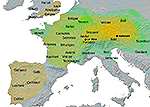
Ancient Europe -
Celtic Tribes
|
 Herodotus, who lived 484-425 BC,
spelled the Celts Keltoi.
Herodotus, who lived 484-425 BC,
spelled the Celts Keltoi.
 Lookie here.
Lookie here.
But for the Greeks, the term Keltoi
generally referred to all northern foreigners.
The British Museum tells us that,
Often all Iron Age people are
called ‘Celts’, but in fact many different sorts of people lived
in different parts of Britain and Europe at this time.
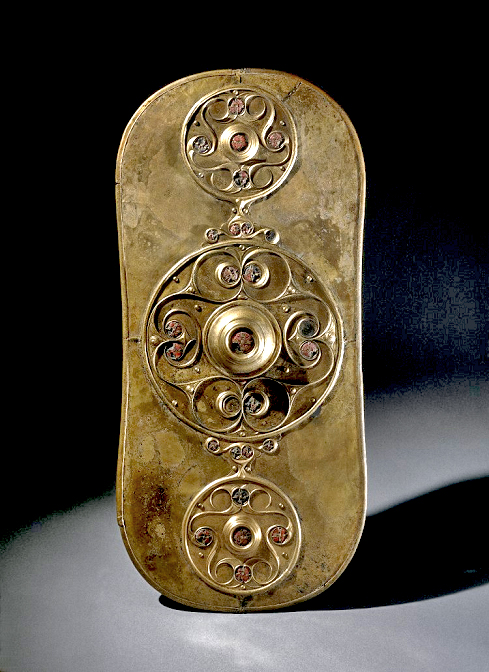
Celtic Shield — The
Battersea Shield
British Museum, London
To the Romans, the Celtic tribes were known as
Gauls. Or so tells us
 Julius Caesar in The Gallic
Wars, Book 1, Chapter 1:
Julius Caesar in The Gallic
Wars, Book 1, Chapter 1:
All Gaul is divided into three
parts, one of which the Belgae inhabit, the Aquitani another,
those who in their own language are called Celts, in our Gauls,
the third.
All these differ from each other
in language, customs and laws.
The river Garonne separates the
Gauls from the Aquitani; the Marne and the Seine separate them
from the Belgae.
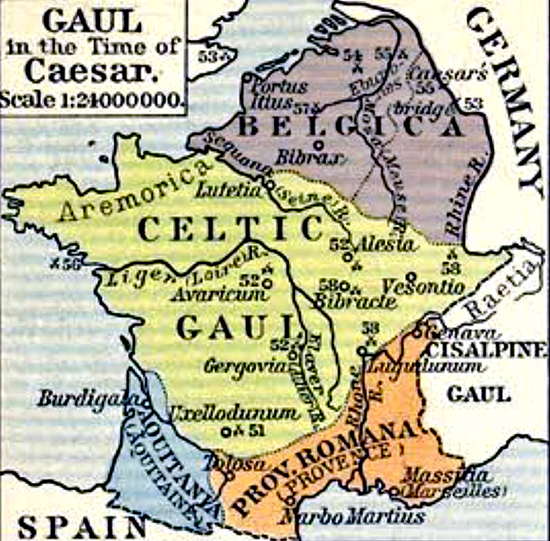
Of all these, the Belgae are the
bravest, because they are furthest from the civilization and
refinement of [our] Province, and merchants least frequently
resort to them, and import those things which tend to effeminate
the mind; and they are the nearest to the Germans, who dwell
beyond the Rhine, with whom they are continually waging war; for
which reason the Helvetii also surpass the rest of the Gauls in
valor, as they contend with the Germans in almost daily battles,
when they either repel them from their own territories, or
themselves wage war on their frontiers.
One part of these, which it has
been said that the Gauls occupy, takes its beginning at the
river Rhone; it is bounded by the river Garonne, the ocean, and
the territories of the Belgae; it borders, too, on the side of
the Sequani and the Helvetii, upon the river Rhine, and
stretches toward the north. The Belgae rises from the extreme
frontier of Gaul, extend to the lower part of the river Rhine;
and look toward the north and the rising sun.
Aquitania extends from the river
Garonne to the Pyrenaean mountains and to that part of the ocean
which is near Spain: it looks between the setting of the sun,
and the north star.
The Celts, or Gauls, sacked Milan in 396 BC and Rome in 390 BC and
only left after having received a truckload of money from the locals
in order to leave them alone.
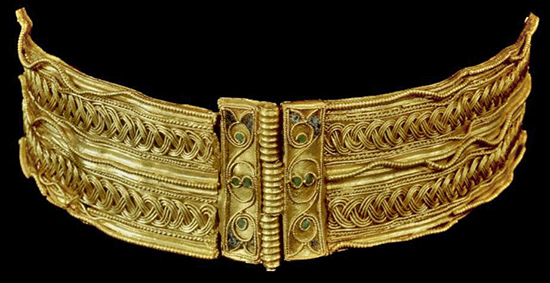
Celtic Bracelet
These and other absolutely amazing
Celtic designs can be explored at the British Museum, London.
The Celtic Tribes
Here is a list of the major Celtic tribes:
The Aedui
The Allobroges
The Aquitani
The Arverni
The Atrebates
The Belgae
The Bituriges
The Boii
The Carnutes
The Celtiberi
The Celtici (Celtae)
The Dardani
The Dumnonii
The Gallaeci
The Galli
The
 Helvetii
Helvetii
The Iceni
The Insubres
The Lingones
The Lusitani
The Nori
The Parisii
The Pictones
The Scordisci
The Senones
The Sequani
The Siturii
The Tectosages
The Treveri
The Veneti
The Vocontii
The Volcae
Here are more maps
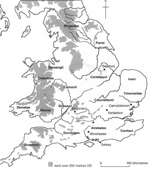
Britain - Tribes in Ancient Britain
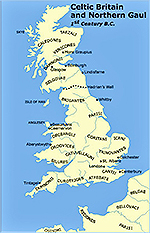
1st Century BC - Celtic Britain and Northern
Gaul - Tribes
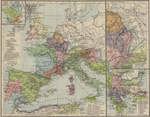
AD 117 Roman Empire
(Shepherd)
And here is more on the
 Stone Age / Bronze Age / Iron Age.
Stone Age / Bronze Age / Iron Age.
See also
 Roman Britain
Roman Britain
More History
|